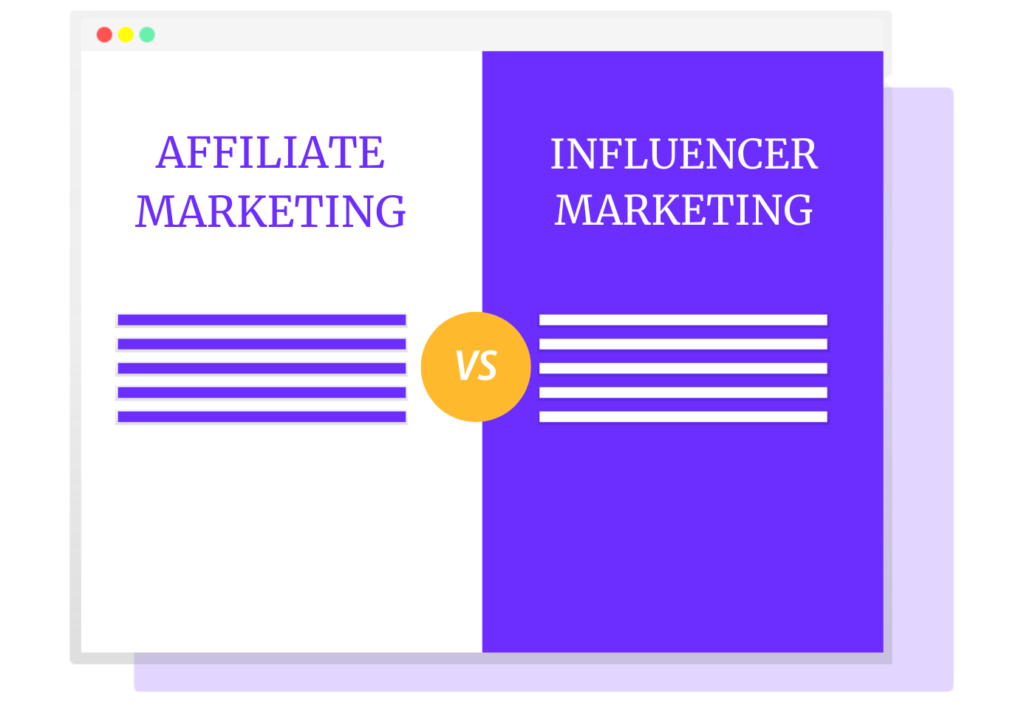Today’s online entrepreneur has a plethora of choices for building a profitable business. Two of the most popular strategies are affiliate marketing and influencer marketing. Each strategy comes with its own unique set of advantages and disadvantages.
So, how do you know which business model is right for you? This comparative guide will show you how the two models differ, the similarities they share, and how you can make the right choice for achieving your goals.
Let’s explore which marketing strategy is better for your business in the battle of Affiliate Marketing vs Influencer Marketing!
- Affiliate Marketing Vs Influencer Marketing: How Are They Similar?
- Affiliate Marketing Vs Influencer Marketing: How Do They Differ?
- Affiliate Marketing Vs Influencer Marketing: Which is Better?
- Which Brings In More Money?
- Which Requires Less Work?
- Final Take on Influencer Marketing Vs Affiliate Marketing
Affiliate Marketing Vs Influencer Marketing: How Are They Similar?

Affiliate marketing is a well-known online business model used by digital marketing entrepreneurs for the last three decades. It has a market value of over $17 billion as of 2023, and it is estimated that affiliate marketing spending in 2023 will be around $13 billion
In contrast, influencer marketing owes much of its popularity to the rise in social media use, making it a much newer digital marketing strategy. Moreover, the Influencer Marketing Industry is set to grow to approximately $21.1 Billion in 2023 and it is one of the preferred marketing methods in modern society.
Although they differ in certain aspects, these two marketing strategies share several things in common.
If your goal is to create an online venture that gives you the flexibility to work remotely or simply wish to explore profitable marketing approaches, here are the key similarities between an affiliate marketing business and influencer marketing:
- Both strategies revolve around promoting products or services through online channels
- Influencers and affiliates rely on building trust and credibility with the target audience
- Earning potential can be substantial in both cases, depending on the reach and effectiveness of your promotions
- Getting started in either field doesn’t require a significant initial investment.
- Similar skill sets are needed for both strategies, such as content creation, social media management, and audience engagement.
- Both business models can offer flexibility and the freedom to work on your own terms
Affiliate Marketing Vs Influencer Marketing: How Do They Differ?

While affiliate and influencer marketing share many similarities, they also have many key differences that set them apart. Knowing the differences is the key to helping you decide which will deliver the best options for achieving your goals.
Here are the main distinctions between influencer marketing vs affiliate marketing:
- Revenue Model: In affiliate marketing, earnings are generated primarily through commissions on successful conversions or sales. Influencer marketing, on the other hand, often involves earning through sponsorships, partnerships, and paid promotions.
- Platform Dependency: Influencer marketing typically relies on established social media platforms to reach and engage with the audience. Affiliate marketing is more flexible, utilizing various channels such as blogs, websites, email marketing, and social media.
- Relationship with Brands: Affiliate marketers usually work through affiliate networks, which serve as intermediaries between them and the brands. Influencers often establish direct relationships with brands, leading to a more personal and authentic connection with the products or services they promote.
- Content Creation: Influencers focus on creating engaging, high-quality content that resonates with their audience, while affiliate marketers primarily concentrate on crafting persuasive promotional content to drive conversions.
- Target Audience: Influencer marketing relies on the influencer’s existing follower base, which is typically niche-specific and highly engaged. Affiliate marketing, in contrast, often targets a broader audience through diverse promotional channels.
- Longevity and Consistency: Influencers must consistently produce content to maintain their relevance and audience engagement. Affiliate marketers can achieve success with evergreen content and promotional strategies that require less frequent updating.
Affiliate Marketing Vs Influencer Marketing: Which is Better?
Deciding whether influencer marketing or affiliate marketing is better for you will hinge on your individual needs, skills, and preferences as an online entrepreneur.
Influencer marketing may be more suitable if you have a strong social media presence or are skilled at creating engaging content that resonates with your audience.
Are you comfortable in front of the camera? Do you have a charismatic personality? Do you already have a dedicated following and enjoy interacting with your community?
If so, then you possess many of the skills necessary for becoming a successful influencer. With a little more effort, you could generate a sizeable income on the back of your already-established personal brand.
On the other hand, if you have a knack for persuasive writing, search engine optimization, and web design skills, affiliate marketing could be a better fit. This business model requires less direct interaction with your audience and opens up more channels for online promotion.
Lastly, depending on the niche you choose, one can work best than the other. So I suggest you also check these blog niche ideas list.
Which Brings In More Money?

The profitability of influencer marketing and affiliate marketing depends on several factors. High-profile influencers can earn substantial income through sponsorships, partnerships, and paid promotions.
Bear in mind that achieving this income level will require a significant investment of time and effort into building and maintaining a loyal following. Being able to nurture profitable relationships with brands and suppliers will also play a major role in your success.
Affiliate marketing, by contrast, offers a more predictable income stream through commissions. While the percentage earned per sale might be lower (depending on the affiliate program), consistent efforts in promoting products and driving traffic to your affiliate links can lead to exponential income gains over time.
Both marketing approaches can be lucrative, but the potential for high earnings in influencer marketing largely depends on the size and engagement of your audience, which is often heavily dependent on the niche you are in.
Which Requires Less Work?

In terms of workload, affiliate marketing is considered less demanding. Once you’ve set up your website or blog, optimized your content for search engines, and embedded your affiliate links, the focus shifts to driving traffic to your promotional materials.
Influencer marketing, conversely, requires regular content creation and active engagement with your audience. As an influencer, you’ll need to maintain your online presence and constantly evolve your content strategy to stay relevant and attractive to brands and followers.
Unlike affiliate marketing, an influencer will find it more challenging to create a hands-off business as their presence and personality is the primary driving force behind their income.
You might want to read:
Final Take on Influencer Marketing Vs Affiliate Marketing
Both influencer and affiliate marketing can be rewarding and profitable online business models. Your choice ultimately depends on your strengths, interests, and resources.
If you go down the influencer path, you will need to devote a significant amount of time to building and promoting your social media presence with video and other forms of content. You will also need to develop close relationships with the brands you choose to promote.
Affiliate marketing will likewise require a good deal of effort to become successful. You will need skills in SEO and website development or know how to outsource this work. While not as critical, affiliate marketing also benefits from a strong social media presence.
While both models require initial effort to establish your presence and strategies, each offers the potential to earn money and enjoy the freedom to work from anywhere.
Now that you have a clearer grasp of the differences between influencer marketing and affiliate marketing, you are in a better position to decide which path best aligns with your goals and preferences. Whichever route you take, plenty of exciting online opportunities are waiting for you.
So, what model best suits your business style?
Will you pursue a career in influencer marketing or affiliate marketing? As always, success will depend on the effort you are prepared to put in.
Let me know by leaving a quick comment below.

RELATED CONTENT
How to Build a Media Plan: A Step-by-Step Guide [Free Templates]
If you are a marketing professional, small business owner, or startup founder, it’s important to…
AI for Business: Key Benefits and How to Get Started
Artificial Intelligence (AI) technology is rapidly changing the business landscape. Its ability to automate processes,…
How to Create Ads with AI: Boost Your Marketing Efforts Today!
Creating ads with AI has never been easier. By leveraging AI tools, you can generate…
Lights, Camera, Conversion: How Photography Can Skyrocket Your Marketing ROI
Photo and video content are what drive contemporary marketing methods. With consumers demanding visual content…




